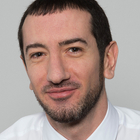The Current Column
Seize the Urchin
The promise of private investment in fragile states and what can be done to mobilize it
Ragoussis, AlexandrosThe Current Column (2019)
Bonn: German Development Institute / Deutsches Institut für Entwicklungspolitik (DIE), (The Current Column of 27 May 2019)
Bonn, 27 May 2019. In 2017, the combined gross domestic product of all 36 countries that the World Bank identifies as fragile amounted to less than that of the German state of North-Rhine Westphalia. Finland alone received more foreign direct investment in that year than all these fragile states together. A lot changes in fragile states from one year to the next; yet, crude numbers like these have not for decades. That is a problem.
Until ten years ago, the development industry had a lot of poverty elsewhere to care about. Much less so today. The world’s poor are increasingly concentrated in fragile states, and we know no better way to tackle this reality than with jobs, services, and the means for people to make a better living. Billions of dollars in development money is now flowing to the conflict-prone places, and the ambition is to add digits to the number.
The impact of that push ripples beyond the strict mandate of development banks. What is at stake is the stability of societies. The way the two interact, poverty and stability, is the subject of dozens of studies in a dozen disciplines. Scholars argue over chickens, eggs, and piecemeal evidence in a debate that is unlikely to reach general conclusions any time soon. But that much we all agree on – poverty and conflict twine together. If we work on one, then chances are we generate better conditions to address the other.
The International Finance Corporation, the private investment arm of the World Bank, released in February its own account of the problem and solutions in a 40-page report; a remarkable step forward in that space. Seven principles summarize the approach. Prime among them is the so-called ‘conflict lens’ by which investment should take place – emphasizing the need to constantly evaluate business actions against possible unintended consequences. But also the idea that money alone does not go far; the abstraction from dilemmas over short and long-term impact; the belief in standards, in newcomers, new solutions, and open borders. Markets in fragile states need them all.
The promise of private investment does not appeal to everyone. Sceptics cite transgressions in the absence of institutional oversight, and violence over resources. The idea of greedy business executives striking deals while others flee to refugee camps does not square with the mission of any international organization. The sceptics are right; the cases they cite are real.
Where one gets it fundamentally wrong is in thinking of the private sector as one actor with a single response to context. Alongside the greedy executives, there is also the vast private sector of individuals whose business decisions are driven by resilience, community belonging and personal creation. No actor has the monopoly of virtue in fragile states; those in the private sector no less than governments, religious leaders, or the international community. People who can build paths out of fragility have to be empowered, individually and collectively to reconstruct, connect, feed, and heal communities in need.
Investing in the private sector boils down to that basic promise. It is about allowing actors other than the state to also provide solutions for themselves and their communities. It is about presence where the state is absent, and about rewards where incentives are distorted. Development banks realize that delivering requires a careful selection of partners, a careful tailoring of solutions, and mobilization beyond what they can achieve on their own.
For those outside fragile states, an investment opportunity in these countries looks like a sea urchin. Little it matters how fresh or eclectic it tastes; in the face of black spikes, most people would rather go for a regular shrimp. Investors are people after all, risk averse, like you and me. How do we mobilize them?
First, many will not come along, no matter what might be on offer. The best hopes lie with those at the margin: investors who feel some affinity with the place, have some understanding of the context, and see more than financial returns to their investment. Second, nobody wants to step into risky territories alone. The determination of a bigger player – a global player – to be there when things turn around, goes a long way towards mobilizing the others. That boils down to principles, like the set the International Finance Corporation put forward. But also to integrity, accountability, a plan and a vision – that old set of qualities that go with leadership in any space. Fast forward, let us not expect the birth of an economic superpower in fragile states with that investment. Some of the economic fundamentals are simply unlikely to get to scale in our lifetime. This is not what is at stake.
Alexandros Ragoussis is Associate Researcher at the German Development Institute / Deutsches Institut für Entwicklungspolitik (DIE) and Economist at the World Bank Group, International Finance Corporation (IFC), Washington DC.

